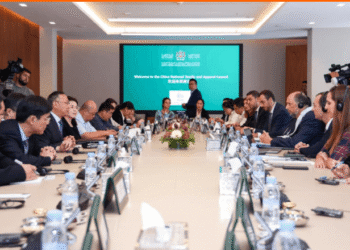Kinshasa has been laying digital tracks in a world that increasingly treats bandwidth as political capital. Over the past two years, the government has ramped up investment in fiber-optic expansion, signed strategic data-sharing agreements, and inserted itself into continental tech forums with a confidence rarely seen from Central Africa’s largest state. The moves have been deliberate, often overshadowed by the country’s mineral headlines, yet they speak to a deeper calculus — securing relevance in the emerging digital order.
Now, that calculus has spilled onto the pitch.
In mid-June, DRC’s tourism ministry unveiled a multi-year partnership with AC Milan. The deal, announced in Rome, includes branding rights, youth academies, and infrastructure upgrades. It came just days before DRC and Rwanda signed a peace agreement in Washington, a sequence that suggests the timing was anything but random.
Rwanda has long understood the power of football diplomacy. Since 2018, it has spent millions on sponsorship deals with Arsenal, PSG, and Bayern Munich, turning stadiums into billboards for its “Visit Rwanda” campaign. Earlier this year, DRC’s foreign minister publicly urged those clubs to reconsider their ties with Rwanda. They didn’t. So DRC made its own move.
The AC Milan partnership is part of Italy’s €5.5 billion Africa strategy, with DRC listed among the priority recipients. Milan’s ownership by RedBird Capital, a U.S.-based firm, adds another layer of geopolitical alignment. While the club hasn’t disclosed the value of the deal, analysts suggest it’s less about revenue and more about visibility. DRC’s tourism budget is modest — just $18 million — while Milan’s annual revenue exceeds €450 million.
The agreement includes plans to refurbish sports facilities and build a school in Boma, in collaboration with the Mama Sofia Foundation. An AC Milan Academy is also in development. The branding campaign — “Explore the DRC, Heart of Africa” — will be featured at Milan’s stadium and training grounds this season, with jersey placement expected by 2026.
Back home, DRC’s domestic football league has struggled to stay afloat. Seasons have been suspended, tournaments left unfinished, and funding remains scarce. Critics argue the Milan deal is a distraction. Supporters see it as a calculated move — a soft power play designed to elevate DRC’s global profile.
Sport isn’t the only arena where DRC is seeking leverage. The European Investment Bank recently backed a major fiber-optic rollout in eastern DRC, led by Bandwidth and Cloud Services Group. The project aims to connect 2.5 million people, 319 schools, and 70 hospitals, and is part of the EU’s Global Gateway initiative. BCS plans to build 12,000 kilometers of digital infrastructure across the country.
Minister of Sport Didier Budimbu has also signed a separate agreement with AS Monaco, and negotiations are underway for a €4.8 million shirt sponsorship. These deals are part of a broader effort to position sport as a diplomatic tool — one that complements DRC’s ambitions in tech, infrastructure, and regional influence.
The Milan partnership fits neatly into this strategy. It offers visibility in Serie A broadcasts, proximity to Italian policymakers, and a new channel for soft power. The goal isn’t just tourism. It’s access, leverage, and presence.
DRC may have arrived late to the football diplomacy game, but it’s playing with intent. The Milan deal isn’t about selling safaris. It’s about signaling ambition. In a region where bandwidth, minerals, and influence are tightly intertwined, football is becoming another instrument of statecraft.
Whether the returns are immediate or delayed, the message is unmistakable: DRC is no longer watching from the sidelines.
Second Eye Africa




